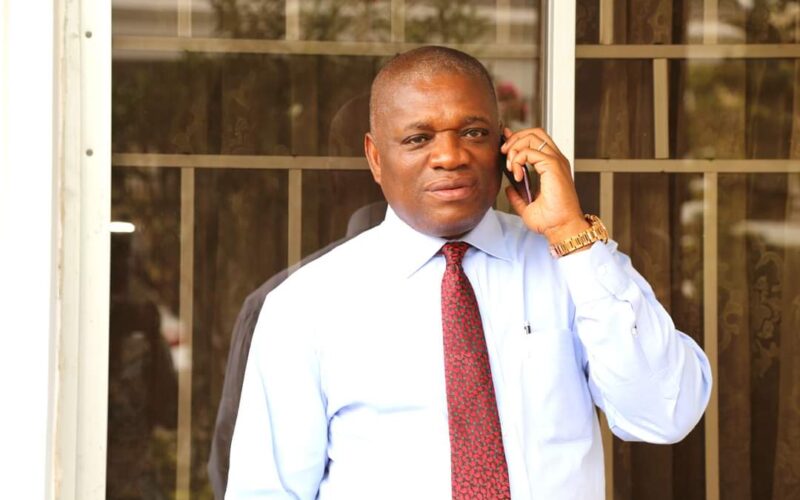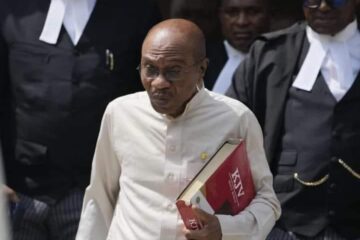Former Abia State governor and Senate Chief Whip, Dr. Orji Kalu has maintained before a Federal High Court that the Supreme Court never ordered his re-trial by the Economic and Financial Crimes Commission(EFCC) on alleged money laundering charges.
Meanwhile, the court has fixed September 20, 2021 for judgment in the suit challenging his re-trial by the ant-graft agency. Justice Inyang Ekwo fixed judgment date after counsel to all the parties to the suit had adopted their legal positions for and against the case. While counsel to the applicant, Prof. Awa Kalu (SAN), George Ukaegbu, counsel to Udeh Jones (2nd respondent) and Chief Chris Uche (SAN) for Slok Nigeria Ltd had respectively urged the couprt to grant the application, the EFCC (1st respondent), through its counsel, Rotimi Jacobs(SAN) on the other hand, urged the court to dismiss it.
The former governor who predicated his case on section 36 (9) of the constitution argued that having been tried, sentenced and convicted by a court over the same charge, FHC/ABJ/CR/56/2007, it would amount to double jeopardy if he is subjected to a fresh trial on same charge. He contented that having been tried, convicted and sentenced the on same charges, FHC/ABJ/CR/56/ 2007, by the court under Justice M.B. Idris, it would amount to double jeopardy if he is subjected to a fresh trial on same charge.
Senator Kalu argued through his counsel that in the absence of any extant judgment or order of a competent court mandating his trial de novo (afresh), the EFCC lacked the legal grounds to proceed with his re-trial.
Awa Kalu submitted that there was no disagreement among parties in the fact that his client was not a party in the appeal before the Supreme Court and that the order of the Supreme Court partains or relates to his client.
“The applicant was not an appellant before the Supreme Court and therefore there is no order of his re-trial pending before the Federal High Court.
Prof. Awa Kalu SAN, counsel to the former governor while adopting his processes informed that Kalu stood for trial for 12 years got judgment that convicted and jailed for 10 years.
The section counsel cited section 36 (9) of the 1999 constitution which stipulates that no Nigerian shall be subjected to double jeopardy.
Awa Kalu insisted that the former governor having served a period of jail term would be subjected to double jeopardy if allowed by the court to be put on trial for the second time.
Professor Kalu produced and read the Supreme Court judgment upon which the ex governor was released after five months in prison adding that there was no where in the judgment where the apex court made order for his client trial.
He challenged the Economic and Financial Crimes Commission EFCC to point out to court where order for retrial was made against the former governor
The senior lawyer then urged the court to prohibit EFCC from going ahead with the planned retrial.
The senior lawyer then urged the court to prohibit EFCC from going ahead with the planned retrial.
But responding, counsel tonthe EFCC, Rotimi Jacobs, asked the court to dismiss the suit with anger.
He submitted that the judgment which led to release of Kalu has been declared a nullity by the Supreme Court which also ordered retrial of the appellant in the matter Mr Udeh Jones who stood trial with Kalu in the same charges.
EFCC argued that since the Supreme Court order benefitted Kalu, he must bear the burden that arose from the apex court verdict.
Jacobs described Kalu suit as approbatimg and reprobating at the same time, frivolous, irritating and sought for it’s dismissal with order of Kalu to face retrial.
Both Chief Uche and Ukaegbu urged the court to dismiss the counter affidavit filed by the EFCC and to enter judgment in favour of the applicant.
In his supporting affidavit deposed in support of his motion, Senator Kalu chronicled the historical background of the trial from his first arrangement and re-arraignment in 2016 and 2017, before the Abuja division of the Federal High Court after the initial charges were amended by the EFCC.
He further narrated how his application to quash the charges was not granted by both the trial court, the Court of Appeal and the Supreme Court.
Kalu told the court that following an application by the EFCC, to the Chief Judge of the Federal High Court, the charge was transferred to the Lagos division of the court and was assigned to Justice M.B. Idris (now a Justice of the Court of Appeal).
That upon the transfer of the charge to Lagos, he bore the cost of movement of his entire legal team from Abuja to Lagos including the cost of accommodation up till judgment.
Senator Kalu disclosed that at the trial, the prosecution called a total of 19 witnesses and thereafter, closed it’s case, necessitating him together with other defendants to enter individually and respectively a no case submission.
He stated how midway through the trial, Justice Idris was elevated to the Court of Appeal as a Justice of the Court and subsequently took the oath of office and subscribed to the oath of Allegiance on June 22, 2018 and lost his position as a Judge of the Federal High Court.
The applicant also narrated how by a Fiat dated July 2, 2018, issued under the hand of the President of the Court of Appeal, Justice Idris was directed to return to the Federal High Court to conclude the trial, then part-heard in charge no: FHC/ABJ/CR/56/2007, between FRN vs Orji Kalu and 2 ors.
That in his judgment on December 5, 2019, Justice Idris convicted and sentenced him with respect to the extant charge.
That following his conviction and sentence, he was incarcerated at the Kuje Correctional Centre where he served part of his term having first spent a few days in the Ikoyi Correctional Centre.
That on May 8, 2020, the Supreme Court in judgment in appeal No: SC.62C/2019, Udeh Jones Udeogu vs FRN & 2 ors, held that the trial of the appellant at the trial court was conducted without jurisdiction and thereby ordered the retrial of the appellant (Udeh Jones Udeogu) without reference to him.
He argued that there is no extant ruling or judgment of a competent court in Nigeria ordering his trial having regard to the fact that the Supreme Court excluded him from the explicit order for retrial arising from charge No: FHC/ABJ/56/2007.
That the unassailable position of the law is that no person who shows that he has been tried by any court of competent jurisdiction or tribunal for a criminal and either convicted or acquitted shall again be tried for that offence having the same ingredients as that offence serve upon the order of a competent court.
That his trial having been pronounced a nulity by the Supreme Court in it’s judgment of May 8, 2020 and without more cannot entitle the EFCC to institute the same charge against him.
Regardless, the EFCC in a response to the suit, asked the court to dismiss it on the ground that the planned re-trial would not amount to a case of double jeopardy.
The commission in it’s response filed on Wednesday, argued that the re-trial is in compliance with the order of the Supreme Court which held that the whole trial was a nullity having been conducted without jurisdiction.




